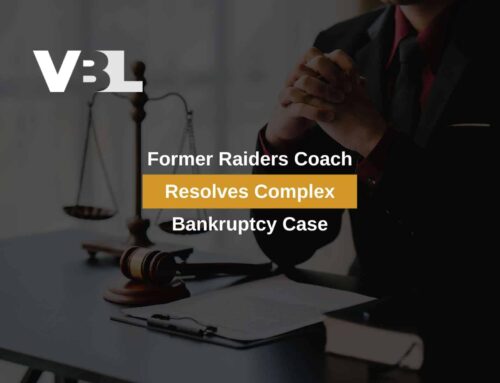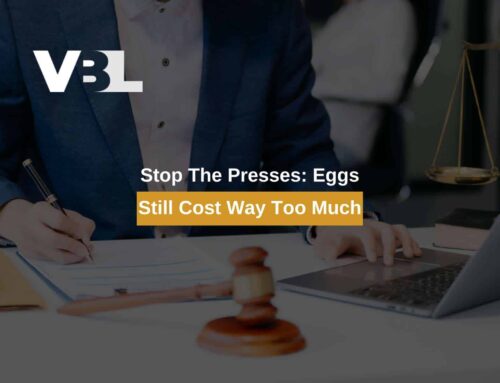Filing For Bankruptcy When Expecting a Baby: What You Need To Know
Expecting a baby is a joyous occasion, but it can also bring financial stress, especially if you’re already struggling with debt. If you live in Las Vegas, Henderson, or Reno, Nevada and are considering bankruptcy, it’s crucial to understand the implications of filing before or after your baby arrives. This comprehensive guide will help you navigate the complex world of bankruptcy and debt relief, ensuring you make the best decision for your growing family.

Understanding Bankruptcy & Debt Relief Options
Before diving into the specifics of filing for bankruptcy when expecting a baby, it’s essential to understand the different types of bankruptcy and other debt relief options available. In the United States, individuals typically file for either Chapter 7 or Chapter 13 bankruptcy, each with its own set of rules and benefits.
Chapter 7 Bankruptcy In Nevada
Chapter 7 bankruptcy, also known as liquidation bankruptcy, involves selling non-exempt assets to pay off creditors. It’s designed for individuals with limited income who cannot repay their debts. The process is relatively quick, often completed within a few months, and most unsecured debts, such as credit card debt and medical bills, are discharged.
Chapter 13 Bankruptcy In Nevada
Chapter 13 bankruptcy, also known as reorganization bankruptcy, allows individuals with a steady income to create a repayment plan to pay off their debts over three to five years. Unlike Chapter 7, Chapter 13 does not involve liquidating assets. Instead, it provides a structured way to manage debt while keeping valuable property, such as your home and car.
Other Debt Relief Options For Henderson & Las Vegas, NV
Bankruptcy isn’t the only option for debt relief. Depending on your financial situation, you might consider the following alternatives:
- Debt Consolidation: Combining multiple debts into a single loan with a lower interest rate can simplify repayment and reduce monthly payments.
- Debt Settlement: Negotiating with creditors to reduce the total amount owed can provide significant relief, but it may negatively impact your credit score.
- Credit Counseling: Working with a credit counseling agency can help you create a budget, manage your finances, and develop a debt repayment plan.
Filing For Bankruptcy Before Or After The Baby Arrives
Deciding whether to file for bankruptcy before or after your baby arrives is a crucial decision that depends on various factors, including your current financial situation, expected medical expenses, and the type of bankruptcy you’re considering. Our bankruptcy team at The Law Offices of Erik Severino can help. Let’s explore the pros and cons of each option.
Filing For Bankruptcy Before The Baby Arrives
Pros:
- Immediate Debt Relief: Filing for bankruptcy before your baby arrives can provide immediate relief from overwhelming debt, allowing you to focus on your pregnancy and preparing for your new arrival.
- Automatic Stay: When you file for bankruptcy, an automatic stay goes into effect, preventing creditors from taking any collection actions against you. This includes stopping wage garnishments, foreclosure proceedings, and debt collection calls.
- Simplified Financial Planning: With your debt situation resolved, you can better plan for future expenses, including baby-related costs.
Cons:
- Medical Debt: If you file for bankruptcy before your baby is born, any medical debt incurred during childbirth will not be included in the bankruptcy discharge. This could leave you with significant medical bills to pay after the bankruptcy process is complete.
- Income Considerations: Bankruptcy courts consider your income when determining your eligibility for Chapter 7 or the terms of your Chapter 13 repayment plan. If you anticipate a significant change in income due to parental leave or reduced work hours, filing before the baby arrives may complicate your case.
Filing For Bankruptcy After The Baby Arrives
Pros:
- Inclusion Of Medical Debt: By waiting until after your baby is born to file for bankruptcy, you can include any medical debt incurred during childbirth in your bankruptcy discharge. This can provide substantial financial relief, especially if you face high hospital and medical bills.
- Adjusted Income: If your income changes after the baby arrives, waiting to file can provide a more accurate representation of your financial situation. This can impact your eligibility for Chapter 7 or the terms of your Chapter 13 repayment plan.
- More Time To Evaluate: Delaying your bankruptcy filing gives you more time to evaluate your financial situation, explore all debt relief options, and make a well-informed decision.
Cons:
- Continued Financial Stress: Postponing bankruptcy means continuing to deal with debt and creditor actions during pregnancy, which can add stress during an already challenging time.
- Potential Loss of Assets: If you wait to file, there’s a risk that creditors could take action against your assets, such as foreclosing on your home or repossessing your car, before you have the protection of the automatic stay.
Discharging Medical Debt In Bankruptcy
One of the significant considerations when deciding when to file for bankruptcy is the ability to discharge medical debt incurred during childbirth. Medical debt is generally considered unsecured debt, meaning it can be discharged in both Chapter 7 and Chapter 13 bankruptcies. Medical debt is the leading cause of bankruptcy filings in Nevada.
Chapter 7 Bankruptcy & Medical Debt
In Chapter 7 bankruptcy, most unsecured debts, including medical bills, are discharged, meaning you are no longer legally obligated to pay them. If you file for Chapter 7 after your baby is born, any medical debt from childbirth can be included in the discharge, providing substantial financial relief.
Chapter 13 Bankruptcy & Medical Debt
In Chapter 13 bankruptcy, medical debt is included in your repayment plan, which lasts three to five years. While you may still need to make payments on your medical debt, the total amount could be reduced, and the remaining balance discharged at the end of the repayment period. Additionally, Chapter 13 can provide a more manageable way to pay off large medical bills over time.
Navigating The Bankruptcy Process In Nevada
Filing for bankruptcy is a complex legal process that requires careful planning and consideration. If you live in Nevada and are expecting a baby, here are some steps to help you navigate the process:
1. Assess Your Financial Situation
Begin by assessing your current financial situation, including your income, expenses, debts, and assets. Determine the total amount of debt you owe and identify which debts are secured (e.g., mortgage, car loan) and unsecured (e.g., credit cards, medical bills).
2. Consult With a Bankruptcy Attorney
Consulting with a bankruptcy attorney is crucial, especially when you’re expecting a baby and dealing with potential medical debt. An experienced attorney can help you understand your options, evaluate the pros and cons of filing before or after the baby arrives, and guide you through the legal process.
3. Gather Financial Documents
Collect all necessary financial documents, including pay stubs, tax returns, bank statements, credit card statements, medical bills, and any other relevant paperwork. Your attorney will need this information to accurately assess your situation and prepare your bankruptcy petition.
4. Complete Credit Counseling
Before filing for bankruptcy, you must complete a credit counseling course from an approved provider. This requirement applies to both Chapter 7 and Chapter 13 bankruptcies. The course provides valuable information on managing finances and alternatives to bankruptcy.
5. File The Bankruptcy Petition
Once you’ve completed credit counseling and gathered all necessary documents, your attorney will help you file the bankruptcy petition with the court. This includes submitting detailed information about your income, expenses, assets, and debts.
6. Attend The Meeting Of Creditors
After filing your bankruptcy petition, you will need to attend a meeting of creditors, also known as a 341 meeting. During this meeting, the bankruptcy trustee and any creditors who choose to attend will ask questions about your financial situation and bankruptcy filing.
7. Complete a Financial Management Course
After your meeting of creditors, you must complete a financial management course from an approved provider. This course covers topics such as budgeting, saving, and managing credit.
8. Receive Your Discharge
If you filed for Chapter 7 bankruptcy, you will typically receive your discharge within a few months of filing. For Chapter 13 bankruptcy, your discharge will occur after you complete your repayment plan, which lasts three to five years.
Special Considerations For Nevada Residents
Nevada has specific laws and exemptions that can impact your bankruptcy case. Understanding these can help you make informed decisions and maximize the benefits of filing for bankruptcy.
Nevada Bankruptcy Exemptions
Bankruptcy exemptions protect certain assets from being sold to pay off creditors. Nevada has its own set of exemptions, which differ from federal exemptions. Some key Nevada exemptions include:
- Homestead Exemption: Nevada’s homestead exemption protects up to $605,000 of equity in your primary residence.
- Vehicle Exemption: You can exempt up to $15,000 of equity in one motor vehicle.
- Personal Property Exemption: This includes household goods, clothing, and other personal items up to $12,000 in value.
- Wages and Income: Up to 75% of disposable earnings are exempt from garnishment.
- Retirement Accounts: Most retirement accounts, including 401(k)s and IRAs, are fully exempt.
Community Property Laws
Nevada is a community property state, meaning that most property and debts acquired during marriage are considered jointly owned by both spouses. This can impact your bankruptcy case, especially if you and your spouse are both considering filing. Consulting with an attorney who understands Nevada’s community property laws is essential to ensure your assets are protected.
Medical Debt & Nevada Hospitals
Nevada residents should also be aware of state-specific programs and protections related to medical debt. Some hospitals and healthcare providers in Nevada offer financial assistance programs for low-income patients. Additionally, Nevada has laws that limit how long medical debt can be collected and what actions creditors can take.
Conclusion
Deciding whether to file for bankruptcy before or after your baby arrives is a significant decision that requires careful consideration of your financial situation, expected medical expenses, and the specific bankruptcy laws in Nevada. Every situation is different. Therefore, by understanding the pros and cons of each option and consulting with an experienced Zero Down to File Bankruptcy at Las Vegas bankruptcy attorney, you can make an informed. Contact us for a free consultation or call (702) 370-0155.

Las Vegas Bankruptcy Lawyers
LAS VEGAS
7251 W Lake Mead BLVD #300
Las Vegas, NV89128
Office: 702-879-2499
Email: [email protected]
HENDERSON
1489 W Warm Springs Rd. Ste 110
Henderson, NV 89014
Email: [email protected]
Additional Information at:
Phoenix Bankruptcy Lawyer
Phoenix DUI Lawyer
Chandler Bankruptcy Lawyer
Vegas Zero Down Bankruptcy Attorney
Gilbert Bankruptcy Lawyers
Arizona Zero Down DUI
AZ Bankruptcy Lawyer
















